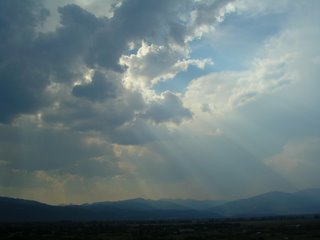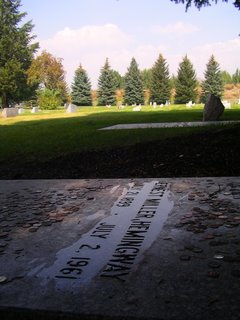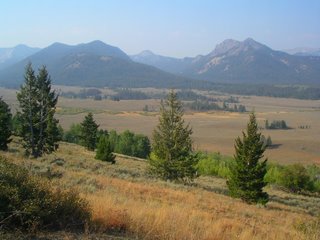 Nestled under a grove of stately spruce trees at the Ketchum Town Cemetary is the gravesite of Ernest Hemingway. Even though he was raised in Illinois (and spent summers in northern Michigan at a family cottage), and also lived in Florida and Cuba, his ultimate resting place is the the Wood River Valley, below alpine mountain peaks and the turquoise Idaho sky.
Nestled under a grove of stately spruce trees at the Ketchum Town Cemetary is the gravesite of Ernest Hemingway. Even though he was raised in Illinois (and spent summers in northern Michigan at a family cottage), and also lived in Florida and Cuba, his ultimate resting place is the the Wood River Valley, below alpine mountain peaks and the turquoise Idaho sky. Hemingway first came to Idaho in 1939 for a stay at the Sun Valley Lodge (where he wrote For Whom the Bell Tolls in room 206). At the time, Sun Valley was a vacation destination for the rich and famous (actually, still is. Part-time residents include Bruce Willis and Arnold Schwarzenegger and Rolling Stone magazine founder Jann Wenner, among many others). Apparently Hemingway liked the area so much he made Idaho his second home for the next 22 years, until his death in 1961.
Hemingway first came to Idaho in 1939 for a stay at the Sun Valley Lodge (where he wrote For Whom the Bell Tolls in room 206). At the time, Sun Valley was a vacation destination for the rich and famous (actually, still is. Part-time residents include Bruce Willis and Arnold Schwarzenegger and Rolling Stone magazine founder Jann Wenner, among many others). Apparently Hemingway liked the area so much he made Idaho his second home for the next 22 years, until his death in 1961. Despite the recognition of being one of America's pre-eminent writers, despite his mythic status as a boxer and a bullfighter, a safari hunter and a man of high adventure, the reality was Hemingway was a deeply-flawed and fallible individual. Not that this is unusual among genuises, but for all his talent, he was to many people, frankly, a total bastard. While those who knew him socially speak with affection of his warmth and generosity, the people closest to him remember a man who was often distant and sullen. Acquintances say he was a master storyteller who would entertain for hours at Ketchum nightspots. His family and close friends say they often didn't know what the hell he was mumbling about.
Despite the recognition of being one of America's pre-eminent writers, despite his mythic status as a boxer and a bullfighter, a safari hunter and a man of high adventure, the reality was Hemingway was a deeply-flawed and fallible individual. Not that this is unusual among genuises, but for all his talent, he was to many people, frankly, a total bastard. While those who knew him socially speak with affection of his warmth and generosity, the people closest to him remember a man who was often distant and sullen. Acquintances say he was a master storyteller who would entertain for hours at Ketchum nightspots. His family and close friends say they often didn't know what the hell he was mumbling about. He was a tragic figure from a family prone to tragedy. His father committed suicide thirty-two years before Hemingway put a shotgun to his own forehead. Two of his siblings also died at their own hands. His granddaughter, Margaux, overdosed on sedatives in 1996. His son, Gregory (who is buried at the foot of his father), died in 2001 in a Miami jail under the name "Gloria" (Gregory has a long and complicated story, one we don't have the time to get into right now. But take our word: it is tragic and unfortunate). All this aside, we honor Hemingway for crafting an uniquely American writing style; for his ability to carve terse prose into volcanos of emotion; for his love of northern Michigan woods he found "as wild as the devil." Sir, we smoke this fine macanudo to your honor. Sorry it's not a Cuban, but times have changed since 1961 and they're a little hard to come by now.
He was a tragic figure from a family prone to tragedy. His father committed suicide thirty-two years before Hemingway put a shotgun to his own forehead. Two of his siblings also died at their own hands. His granddaughter, Margaux, overdosed on sedatives in 1996. His son, Gregory (who is buried at the foot of his father), died in 2001 in a Miami jail under the name "Gloria" (Gregory has a long and complicated story, one we don't have the time to get into right now. But take our word: it is tragic and unfortunate). All this aside, we honor Hemingway for crafting an uniquely American writing style; for his ability to carve terse prose into volcanos of emotion; for his love of northern Michigan woods he found "as wild as the devil." Sir, we smoke this fine macanudo to your honor. Sorry it's not a Cuban, but times have changed since 1961 and they're a little hard to come by now. One thing that hasn't changed, you'll be happy to hear, is the view of the headwaters of the Salmon River, north of Ketchum and just over the Galena Summit. It looks just how you described when you wrote this obituary for a friend, decades ago:
One thing that hasn't changed, you'll be happy to hear, is the view of the headwaters of the Salmon River, north of Ketchum and just over the Galena Summit. It looks just how you described when you wrote this obituary for a friend, decades ago:
Best of all he loved the fall
The leaves yellow on the cottonwoods
Leaves floating on the trout streams
And above the hills
The high blue windless sky
Now he will be part of them forever
skip to main |
skip to sidebar
Pithy Banter and Less Than Inspired Photography

